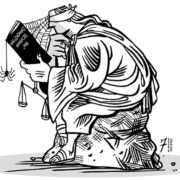ACCORDING to a report from Bloomberg Businessweek, a Gallup poll revealed that the Philippines is the “most emotional” nation in the world.
The survey was conducted in 152 countries, with the Philippines ranking 151st among the least emotional nations — conversely making us the”most emotional” country among the lot.
Social media was replete with mixed feedback amongkababayans in different parts of the world. Some see it as a deterrent to progress, others think that embracing our emotions makes us more human.
For a country that has been indoctrinated with 300 years of stringent and conservative Catholic values and is still gripped deeply by telenovelas and celebrity worship, this may not sound so surprising.
And our flair for the dramatics does not end with fictitious TV shows — we also get profoundly affected by real-life drama (like the recent “Amalayer” incident). Our scathing comments in social media can make a seemingly mundane topic trend online.
We’ve been riled up several times in the past — when Jessica Sanchez only became a runner-up in American Idol, we were flabbergasted.
When Manny Pacquiao unfairly lost to his fight with Timothy Bradley, we were more infuriated than the pound-for-pound champ himself.
When Adam Carolla aired a racial slur against Filipinos in his podcast, we were on attack mode.
We’ve raised our voices and displayed our ire on print, TV and social media so many times, some already construe us as an overly sensitive people.
Yet, one can only surmise if being emotional is conversely proportional to a nation’s development. There are key moments in our nation’s history that would refute such an analogy.
Had we been indifferent, EDSA People Power would have never happened. We would’ve chosen to remain in the status quo; likewise, soldiers would have shot and killed thousands of innocent kababayans, instead of giving in to offerings of flowers, rosaries and prayers.
Remittances would not have kept our economy afloat in these trying times, but thanks to our hardworking OFWs (who never cease to send money back home to their loved ones), we have managed to still do so up to now.
Chief Justice Renato Corona would not have been impeached (convoluted court room drama and heated arguments in the Senate hearings, notwithstanding.)
The Cybercrime Law would not have been put under a temporary restraining order; Sen. Tito Sotto would not have been reprimanded so harshly for plagiarism.
If anything, it only shows how much we value our constitutional rights and our democracy.
But as everything else in life, exercising this freedom should be done in moderation and not without sound judgment. Anything beyond rational can be considered as abuse.
The biggest hindrance to progress is not our human tendency to be emotional. On the contrary, indifference and complacency will bring about our downfall.
(AJPress)





